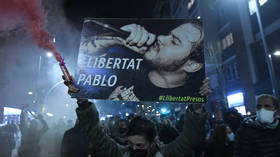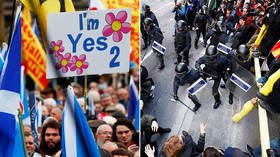Spain risks more riots as free speech crackdown and rapper’s jailing reveal a country still struggling to escape Franco’s legacy

Millions of Spaniards still remember life under fascism. Now, with lockdown’s limits on freedom compounded by the erosion of free speech under Franco-style laws, as seen by Pablo Hasél’s jailing, a new generation is fighting back.
Riots that played out across Spain for the third night in a row over the jailing of rapper Pablo Hasél show a growing appetite for dissent, and are further proof that the shadow of former dictator Francisco Franco – dead for nearly 50 years now – has cast a long shadow.
In a scene recalling the repression of the White Terror years of Spain’s civil war in the 1930s, as he was led away from his holding cell, Hasél cried, “It is the fascist state that is arresting me. Death to the fascist state!”
The draconian legislation that did for the perfomer was enacted just six years ago, but infused with sentiments of a past era, making prison-term crimes of glorifying terrorism, offending religious sentiment and insulting the Crown or state institutions, in an alarming affront to free speech.
So, Hasél now finds himself locked up for a series of tweets that, among other things, called former King Juan Carlos a Mafia boss – he’s currently living in exile as a national disgrace – and accused police of torturing and killing demonstrators and migrants.
There have been more than 80 arrests over three nights of rioting so far in Madrid, Barcelona, Valencia and elsewhere, which have left 100 injured, including a 19-year-old woman who lost an eye to a foam-tipped bullet of the type used by the Spanish police. I can’t wait to hear their defence of those allegations.
This is not 1930s Franco-ist Spain, remember; this is a modern Western democracy, part of the European Union, supposedly committed to liberal values, including the freedom of expression, even if that means upsetting people on social media. But old habits, it seems, die hard.
In a belated attempt to meet protesters’ demands, Spanish Justice Minister Juan Carlos Campo pledged reform – not repeal – of the hated 2015 Public Security Law, which has been used to curtail free assembly and muzzle protest. However, he made no mention of freeing the imprisoned Hasél.
Instead, in a highly provocative move, the Catalonia court authorities doubled down on the controversial decision to jail the rapper by declaring that they are looking to extend his prison sentence for a further 30 months for having committed an assault and obstructed justice in 2017.
That’s flipping the bird to the government’s ruling coalition junior partner, Unidas Podemos, which filed a petition yesterday calling for a “total pardon” for Hasél and for the crimes in question to be no longer punishable by law. Unidas Podemos has been accused by the ruling majority Spanish Socialist Workers’ Party (PSOE) of defending the violent protests. PSOE is also upset because Podemos used the F-word: Franco.
In its proposals to the Congress of Deputies, the Spanish legislature’s lower house, Podemos picked out articles from the national penal code that were being used to criminalise behaviour. They included “sending messages through social media, singing rap, using an image of Jesus Christ and publishing it on social media, staging a performance to ask for equal rights for women in society”. And then it pointed out the elephant in the room: “These are articles of the penal code whose influence stems from the [Franco] dictatorship, and thus [they] have no place in a democratic and plural system.”
In one of the incidents referenced, three women were charged with crimes against religious sentiment for parading through the streets of Seville in 2014 a giant model vagina – instead of the usual statue of the Virgin Mary traditionally borne aloft in Spain’s frequent religious processions. They presented said model as an “insubordinate pussy”.
Another case saw a 21-year-old student sentenced to a year in prison for having made a series of off-colour jokes on Twitter in 2017 about the 1973 terrorist attack by Basque separatist group ETA that led to the death of a Francoist politician. The dead man’s granddaughter’s appeal to the court to drop the charges because the jokes did not offend her was ignored.
While most Western democracies would brush off incidents such as this, they have resulted in an authoritarian crackdown in Spain that is having a chilling effect on free expression.
Also on rt.com Mandatory unconscious bias training has been ditched by UK government as experts say it makes people MORE prejudicedAs campaigners up the rhetoric, one group of 200 artists, supported by filmmaker Pedro Almodóvar and actor Javier Bardem, made clear their unease in a petition, declaring: “the imprisonment of Pablo Hasél makes the sword hanging over the heads of all public figures who dare to openly criticize the actions of state institutions all the more evident. We are aware that if we allow Pablo to be jailed, tomorrow they could come after any one of us, until they have managed to stifle any whisper of dissidence.”
With the years under Franco repression often referred to as the Spanish Holocaust, it’s difficult to ignore the echo of Martin Niemöller’s “First they came for the socialists”, anti-Nazi quotation haunting this appeal.
While some might attempt to shrug off recent events as a government clumsily attempting to legislate in the age of social media, and the protesters as angry people thoroughly sick of interminable lockdowns and wanting to show their displeasure by burning cars and smashing up stores, this is to miss the point. This is Spain.
El Caudillo ruled with an iron fist for 36 years and, at the time of his death in 1975, he had been responsible for the deaths of 200,000 Spanish citizens in civil war, through forced labour, in concentration camps and by execution.
Millions are still alive today who remember Franco. So when his name is invoked in the political realm as an inspiration behind laws intended to keep Spaniards in line during a time when freedom of movement and now freedom of expression face unprecedented restrictions, it is deeply unsettling.
Unless Pedro Sánchez and his Spanish government repeal the offending legislation, pardon Pablo Hasél and close this latest chapter of overbearing authoritarianism, the trouble will continue to escalate.
General Franco needs to be laid to rest, for good.
Like this story? Share it with a friend!
The statements, views and opinions expressed in this column are solely those of the author and do not necessarily represent those of RT.














